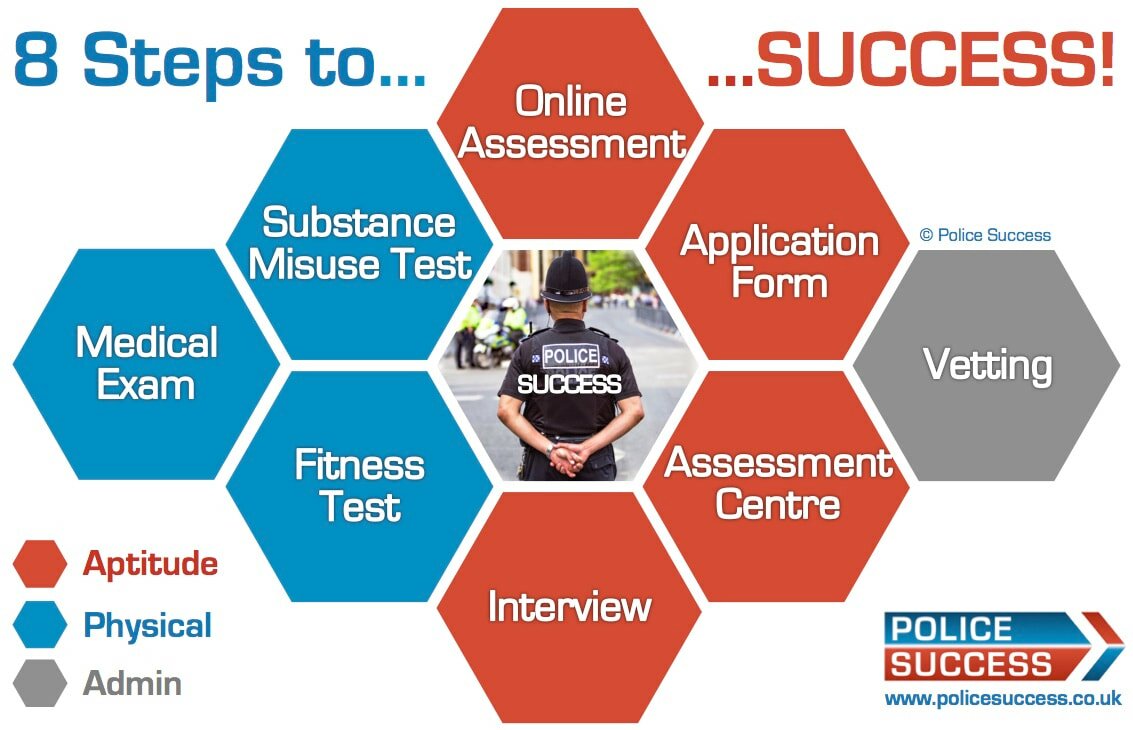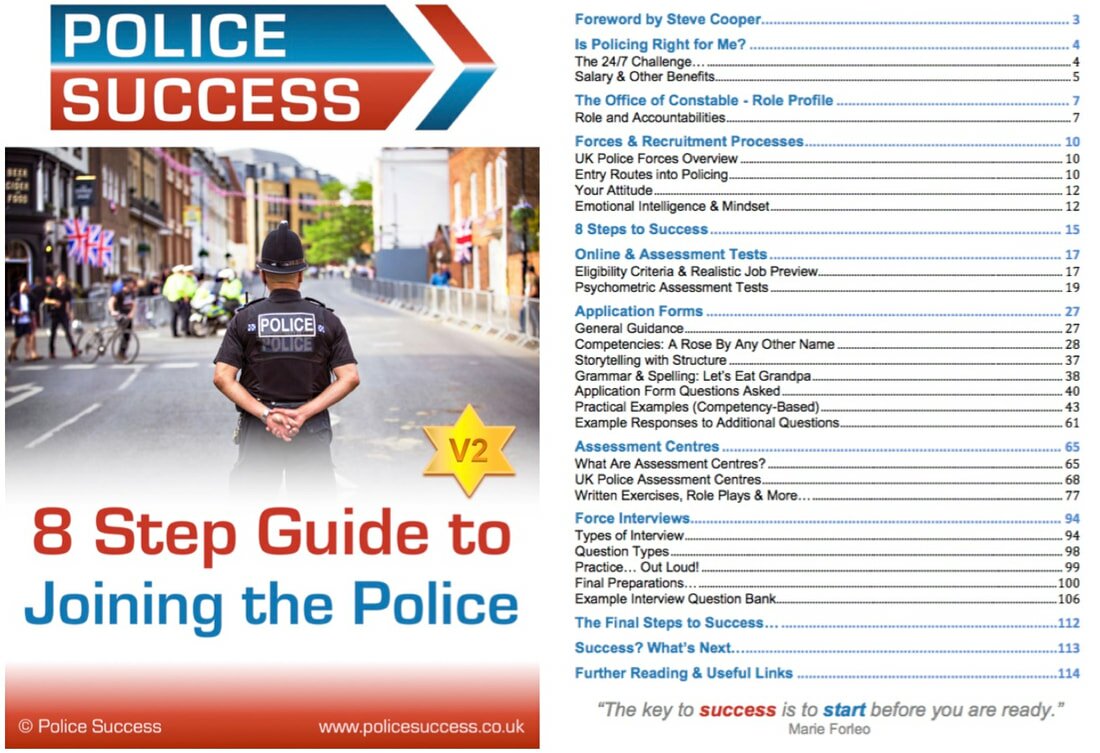8 Steps to Joining the Police (Part One)
“A smooth sea never made a skilled sailor.”
- Franklin D. Roosevelt
In the Police Success comprehensive guide to becoming a UK police officer, I break down the journey into 8 steps, providing guidance on how to pass each in detail. Joining the police will be a challenge, both mentally and physically, but now is a fantastic time to join as most forces are doubling their recruitment intakes. However, it remains a highly competitive process, so recognising the journey ahead will help. Here are the broad steps you will take, which as shown in the image I group into three simple themes of aptitude, physical and administrative:
Forces around the UK may do things in a slightly different order, different way, or with slightly different standards. I will summarise each in this two-part blog series to give you a complete overview of the process. Further links are shared for further reading, or of course you can get the ultimate support and simply download the detailed guide to success…
Step 1: Police Officer Application Form
“What can be asserted without evidence can be dismissed without evidence.”
- Christopher Hitchen
Having decided that becoming an officer is the role for you, it’s a good idea to first check your eligibility. The eligibility criteria are similar for most forces as outlined on the Police Success FAQ pages. But as a head start, here are the eligibility criteria for Scotland, the eligibility criteria for PSNI, and also for England & Wales forces.
Application forms have largely moved online during 2020. This is a step where ¾ of officer applicants fail, so it’s important to spend the time getting it right! The application form isn’t just about outlining your qualifications, sharing personal details and any other information to ensure you match the eligibility criteria. The ‘scoring’ parts give you the opportunity to answer a mix of competency-based questions, experience and motivations for joining the police. Extensive guidance and examples are provided in the full guide, but here is a free blog on applications you can read right away to give you a head start.
Step 2: Online Assessments & Selection Tests
“You have to learn the rules of the game, then play them better than anyone else.”
- Albert Einstein
Online assessment tests are a core part of UK police recruitment processes. In fact this year, much of the process has moved online as part of the new ‘online police assessment centres’ as a response to COVID-19 in England & Wales; your assessment tests may be wrapped up in the ‘virtual assessment centre’ but forces may choose to do additional ones. Police Scotland call theirs the ‘Police Scotland Entrance Test’ and PSNI now have an ‘Initial Selection Test’.
Either way, they are all forms of psychometric tests for which you can practice extensively before trying to simply ‘wing it’ on the day. Common examples include:
- Literacy & Numeracy tests
- Situational Judgement Tests - Verbal Reasoning Tests - Inductive Reasoning Tests
I cover each kind of test in the ‘Police Success Guide to Joining the Police’ to familiarise you, but ultimately ‘practice makes perfect’! Note that with the tests now being online, you’ll need to complete them in one go. So clear your room of any distractions and be sure to check your Internet connection!
Step 3: Assessment Centre
“Remember the three P's of success: Passion, Planning and Perseverance.”
- Homer Hickman
Brace yourself for interrogation! An assessment centre (or day) combines tasks and activities to test your abilities as a police officer.
Most police assessment centres have moved online in the wake of COVID-19. Be them ‘Day One’ for England & Wales or bespoke police assessment centres for Scotland and PSNI, the police recruitment assessment centres combine a mix of psychometric and behavioural assessments. They may include written assessments, briefing exercises, role-plays, interviews, in-tray exercises and more psychometric tests. Note that the behavioural tests will be assessed against the behaviours outlined in the policing Competencies & Values Framework, with all explained extensively in the guide. For now and for free, here are some blogs to give you further food for thought:
Steps 4-8: Coming Soon...
Look out for the next Police Success Blog, where I will outline police recruitment interviews and other remaining steps of the selection process. In the meantime, you can get a head start right away with this all-inclusive guide to joining the police…
I hope you found this blog helpful, whether you are an aspiring to join the police as a member of the public, leaving the military, a serving Special Constable or PCSO. Download the comprehensive Police Success guide (below) for more detailed guidance, or feel free to arrange some 1-2-1 coaching for bespoke support. The guide includes comprehensive information about the role, CVF, assessment tests, application interviews, practice questions, and much more to help you excel and achieve your ambition to joining the police!
Kind Regards, Steve
0 Comments
Leave a Reply. |
 RSS Feed RSS Feed
AuthorA former Royal Marine, Detective Inspector, and is a qualified coach/mentor. With extensive police experience, Steve also established Rank Success to help officers achieve police promotion. CategoriesAll ArchivesFebruary 2021 |







